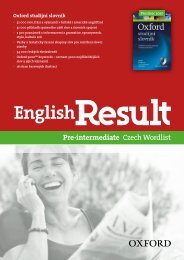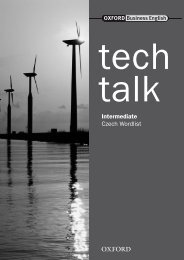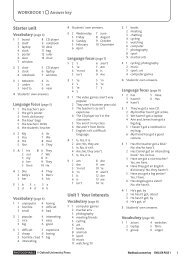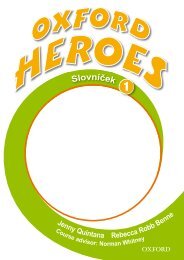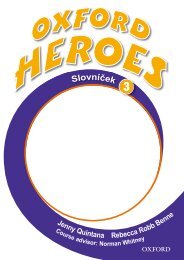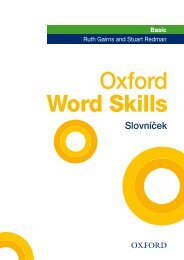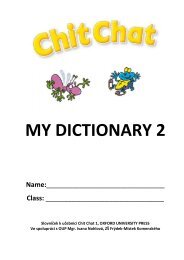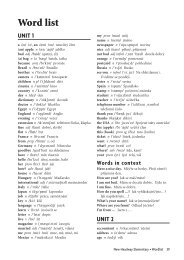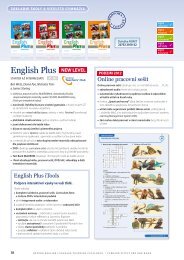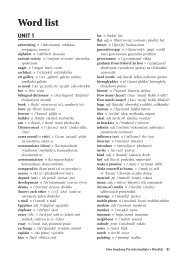You also want an ePaper? Increase the reach of your titles
YUMPU automatically turns print PDFs into web optimized ePapers that Google loves.
The magic formula for getting students to talk<br />
Make discussions easy and enjoyable for students with Bookworms Club. These carefully graded short stories<br />
have been specially selected for reading in small groups. With Bookworms Club you will give students a<br />
reason to communicate, which is what many teachers are looking for.<br />
Reading Circles<br />
If you are looking for a way to increase the amount your learners read,<br />
and encourage natural, enjoyable discussion in the classroom, why not try<br />
experimenting with Reading Circles. For those unfamiliar with the simple<br />
concept, a Reading Circle is a group of up to six learners who meet in the<br />
classroom to discuss the text they are all reading. Each learner has a<br />
“role” within the Circle, for example “discussion leader”, “word master”,<br />
or “summariser”, and each role is supported by a series of questions on a<br />
worksheet which the learner has to complete whilst reading. The questions<br />
provided on the worksheets help to structure the learners’ reading and provide<br />
prompts for discussion when the Circle meets.<br />
Reading Circles encourage reading in manageable amounts outside<br />
the classroom of texts chosen by you and your learners, provide an<br />
environment where each learner’s opinion counts and each learner gets a<br />
chance to speak. And all within 35–40 minutes at intervals of your choice.<br />
Very simple, yet very effective.<br />
For more information on Reading<br />
Circles, the Bookworm series of graded<br />
<strong>readers</strong>, and a sample of the “role”<br />
worksheets visit OUP’s webpage at<br />
http://www.oup-bookworms.com/<br />
reading-circles.cfm<br />
Happy reading,<br />
Nikki Fořtová, B.A., Faculty of Arts,<br />
Masaryk University in Brno<br />
Reading for/with pleasure in ELT<br />
What does pleasure from<br />
reading mean in general?<br />
It is everything that drives<br />
us to read and read again, all<br />
the reasons why we say ‘I like<br />
reading books,’ everything that<br />
helps us immerse ourselves<br />
in the content. Reading for/<br />
with pleasure in ELT proves<br />
invaluable for developing<br />
communicative competence.<br />
When reading for pleasure we<br />
focus more on content than vocabulary<br />
or structures. In that<br />
case students think in English,<br />
which is necessary for successful<br />
communication. Furthermore,<br />
students build a positive<br />
attitude towards language and<br />
develop their critical thinking<br />
and creativity <strong>sk</strong>ills. My idea<br />
of how to incorporate this into<br />
the school syllabus is to establish<br />
a <strong>readers</strong> club.<br />
What can students do<br />
in a reading club?<br />
Cocktail reading: various illustrations,<br />
segmented text,<br />
reading aloud, silent reading,<br />
glossary in the margin, key<br />
words in bold, fully dramatized<br />
audio recording – all<br />
these features help the reader<br />
to grasp the content of the<br />
text. Students can get different<br />
input cocktails – e.g. students<br />
read and listen to the audio<br />
with sound effects or read and<br />
watch the pictures at the same<br />
time – it turns their attention<br />
to the content. Graded <strong>readers</strong><br />
eliminate the barriers,<br />
enable reading with pleasure<br />
and provide high quality<br />
language input.<br />
Chain game: What is… the<br />
most interesting information you<br />
have read today?/the nicest thing<br />
XX did in this story?/What have<br />
you learned from this book?/What<br />
do you think about …? and many<br />
other questions a<strong>sk</strong>ing for<br />
personal opinion capitalize<br />
on students’engagement and<br />
impression after reading. As it<br />
is a chain game, everyone is<br />
involved and practices expressing<br />
an opinion.<br />
Quiz exchange: two groups<br />
read different chapters of a<br />
book and prepare a quiz about<br />
the content. Then they swap<br />
the chapters, read the text and<br />
both groups complete the quiz.<br />
Students always learn something<br />
new and get practice in<br />
teamwork.<br />
Real projects: Students make<br />
projects using surveys, searching<br />
for information, evaluating<br />
collected data, etc. The message<br />
or information gained from the<br />
text is being transformed. This<br />
is good practice in interpreting<br />
the text.<br />
It is clear that pleasure is not<br />
the only outcome of ELT reading<br />
programme. With the proper<br />
material it also improves students’<br />
speaking and writing<br />
<strong>sk</strong>ills, social <strong>sk</strong>ills, cognitive<br />
and pragmatic <strong>sk</strong>ills, and<br />
much more.<br />
Have you set up a reading<br />
club at your school? If so, how<br />
did you do it? How do you keep<br />
it interesting? What reading<br />
materials do you use? Let us<br />
know.<br />
Eva Balážová,<br />
ELT Consultant, Oxford University<br />
Press Slovakia<br />
NOVINKY Z OXFORDU 11



